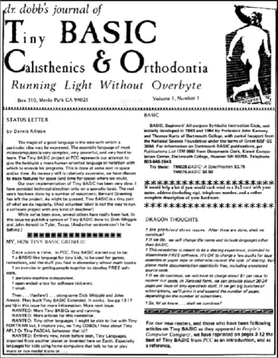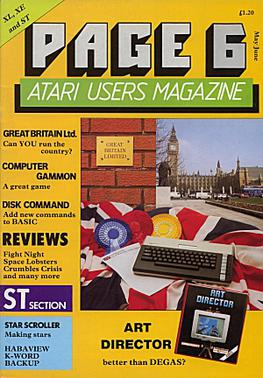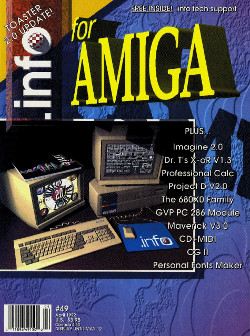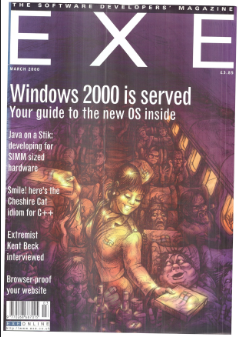Related Research Articles
Tiny BASIC is a family of dialects of the BASIC programming language that can fit into 4 or fewer KBs of memory. Tiny BASIC was designed by Dennis Allison and the People's Computer Company (PCC) in response to the open letter published by Bill Gates complaining about users pirating Altair BASIC, which sold for $150. Tiny BASIC was intended to be a completely free version of BASIC that would run on the same early microcomputers.
Computer magazines are about computers and related subjects, such as networking and the Internet. Most computer magazines offer advice, some offer programming tutorials, reviews of the latest technologies, and advertisements.

Dr. Dobb's Journal was a monthly magazine published in the United States by UBM Technology Group, part of UBM. It covered topics aimed at computer programmers. When launched in 1976, DDJ was the first regular periodical focused on microcomputer software, rather than hardware. In its last years of publication, it was distributed as a PDF monthly, although the principal delivery of Dr. Dobb's content was through the magazine's website. Publication ceased at the end of 2014, with the archived website continuing to be available online.
In computing, an opcode is an enumerated value that specifies the operation to be performed. Opcodes are employed in hardware devices such as arithmetic logic units (ALUs) and central processing units (CPUs) as well as in some software instruction sets. In ALUs the opcode is directly applied to circuitry via an input signal bus, whereas in CPUs, the opcode is the portion of a machine language instruction that specifies the operation to be performed.
Phillip JamesPlauger is an author, entrepreneur and computer programmer. He has written and co-written articles and books about programming style, software tools, and the C programming language, as well as works of science fiction.

PC Magazine is an American computer magazine published by Ziff Davis. A print edition was published from 1982 to January 2009. Publication of online editions started in late 1994 and continues as of 2024.

Page 6 was a British magazine aimed at users of Atari 8-bit computers and Atari ST home computers. The first issue was in 1982, and it was renamed to Page 6 Atari User and then New Atari User before ceasing publication in 1998.

.info was a computer magazine covering Commodore 8-bit computers and later the Amiga. It was published from 1983 to 1992.
UBM Technology Group, formerly CMP Publications, was a business-to-business multimedia company that provided information and integrated marketing services to technology professionals worldwide. It offered marketers and advertisers services such as print, newsletters, custom web sites, and events. Its products and services include newspapers, magazines, Internet products, research, education and training, trade shows and conferences, direct marketing services and custom publishing.
Otaku USA is a bimonthly magazine published by Sovereign Media, which covers various elements of the "otaku" lifestyle from an American perspective. The issues were accompanied by a DVD featuring three anime episodes but as of 2009 the DVD feature was dropped and the double sided poster feature of the Magazine was also dropped starting with the February 2010 issue.

InformationWeek is a digital magazine which conducts corresponding face-to-face events, virtual events, and research. It is headquartered in San Francisco, California and was first published in 1985 by CMP Media, later called Informa. The print edition of the magazine has ceased, with the last issue published on June 24, 2013.
People's Computer Company (PCC) was an organization, a newsletter and, later, a quasiperiodical called the Dragonsmoke. PCC was founded and produced by Dennis Allison, Bob Albrecht and George Firedrake in Menlo Park, California in the early 1970s.

A periodical literature is a published work that appears in a new edition on a regular schedule. The most familiar example is a newspaper, but a magazine or a journal are also examples of periodicals. These publications cover a wide variety of topics, from academic, technical, trade, and general interest to leisure and entertainment.
Microsystems was a personal computing magazine founded by Sol Libes and published from January 1980 to November 1984. Oriented toward the home and business personal computer user, it included an editorial page, letters from readers, technical articles, and advertisements. As a historical reference, it is notable for chronicling in detail the early days of the personal computer. Topics covered in its issues included:

.EXE Magazine was a monthly computer software magazine published in the United Kingdom from 1986 to 2000.
Overload is a bi-monthly professional computer magazine published by ACCU, that was established in 1993 and is edited by Frances Buontempo. It aims to "publish a high standard of articles about all aspects of software development". All issues of Overload, starting from August 1998, are available online.

Byte was a microcomputer magazine, influential in the late 1970s and throughout the 1980s because of its wide-ranging editorial coverage.
The Dr. Dobb's Excellence in Programming Award was an annual prize given to individuals who, in the opinion of the editors of Dr. Dobb's Journal, "made significant contributions to the advancement of software development." The Excellence in Programming Award includes a $1,000 prize that was donated in the award winner's name to a charity of the winner's choice. The award was launched in 1995 in the print edition of Dr. Dobb's Journal and was given each year until 2009. In his March 1995 article introducing the awards, then editor-in-chief Jonathan Erickson wrote that the award was intended to recognize "achievement and excellence in the field of computer programming." Erickson explained that the winners were "selected by a special editorial committee" of the magazine. Because Dr. Dobb's serves an audience of software developers, the Excellence in Programming Award is specifically intended to recognize resources for programmers: languages, code libraries, tutorial books, and so on. Developers of shrinkwrap software intended for retail sale, custom software for corporate use, embedded software, or general-purpose applications were not considered for the award.

The Software Tools Users Group (STUG) was a technical organization started in 1976, in parallel with Usenix. The STUG goal was to develop a powerful and portable Unix-like system that could be implemented on top of virtually any operating system, providing the capabilities and features of Unix in a non-proprietary system. With its focus on building clean, portable, reusable code shared amongst multiple applications and runnable on any operating system, the Software Tools movement reestablished the tradition of open source and the concepts of empowering users to define, develop, control, and freely distribute their computing environment.
References
- 1 2 "C/C++ users journal". NCBI. Retrieved June 2, 2020.
- ↑ Jaeschke, Rex (April 1985). "/* Editor's comment */". The C Journal. 1 (1). InfoPro Systems: 46.
- ↑ Plauger, P. J., ed. (1991). C Users J., June 1991. Vol. 9. Lawrence, KS, USA: R & D Publications, Inc.
- ↑ Plauger, P. J., ed. (1994). C/C++ Users J., July 1994. Vol. 12. USA: CMP Media, Inc.
- ↑ "Computer Magazines". Computer Hope. Retrieved October 26, 2015.